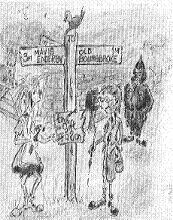 While England were winning the test match and the Chinese were impressing the world with their lavish Olympics opening ceremony – doesn’t interest me one iota – the Russians were invading Georgia. (I expect more than a few Americans were taking shelter in their cellars on hearing the news).
While England were winning the test match and the Chinese were impressing the world with their lavish Olympics opening ceremony – doesn’t interest me one iota – the Russians were invading Georgia. (I expect more than a few Americans were taking shelter in their cellars on hearing the news).It’s a good excuse for aggression against a neighbouring country, isn’t it? Just dish out passports to citizens of a foreign state and then claim to be going in to protect them.
It reminds me of Germany and the Sudetenland in 1938.
That thought brings me to Went the Day Well?, a 1942 Ealing film directed by Cavalcanti. The title is taken from an anonymous poem, which begins:
Went the day well?
We died and never knew.
But, well or ill,
Freedom, we died for you.
Went the day well?
A sleepy English village is surprised to find itself playing host to a company of army sappers. It’s not long before they are revealed as Germans in disguise, there as an advance guard for an imminent German invasion.
Once unmasked they behave with great brutality, but the villagers show enough initiative and no little brutality themselves in fighting back until relief arrives.
The same plot was used in The Eagle Has Landed, the 1976 John Sturges film based on Jack Higgins’ novel. The following link will take you to a pretty full analysis of how the depiction of Germans changed in the years following World War II.
http://www.britmovie.net/britforum/best-british/3649-went-day-well-1942-eagle-has-landed-1976-a.html
I’m sure it started earlier but offhand the earliest film I recall which showed Germans in a sympathetic light is The Enemy Below (1957), which tells the story of two decent professionals, one American one German, full of respect the one for the other despite their need to kill the other.
In particular it draws a distinction between ‘Germans’ and ‘Nazis’, a dubious distinction used again in The Guns of Navarone and Where Eagles Dare, and then of course in The Eagle Has Landed, where the leading German is played by the English national treasure, Michael Caine.
In Went the Day Well? Nazis are Germans, Germans are Nazis, and both are bastards. One even twists a boy’s ear for nosiness. That’s one of the little giveaway signs with which these not-so-efficient Teutonic fifth columnists arouse suspicion.
But, no carping. This is a good film, not just a piece of wartime propaganda and an interesting social document.
Things to enjoy include the intrusion of real war into a sleepy English village, previously for the most part a mere spectator of the conflict; the clever creation of a microcosm of England with such as evacuees, land girls, a sailor on leave; the depiction of class from the lady of the manor to the local poacher; the humorous prejudice shared by English and Germans about the French, and the comment about the Italians – morale’s wot the Italians ain’t got.’
There are parallel stories of betrayal as the woman who increasingly suspects the German charade mirrors that of the traitor whom she had loved. And most of all, in scenes reminiscent of Straw Dogs, there are one or two startling outbursts of horrific violence from the most unlikely characters.
The film, though made in 1942, begins in the future, after the war has been won. The action is a memory, and Hitler has had his come-uppance.
The Germans, probably, learnt their lesson. Not so the Russians.




